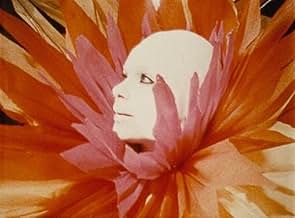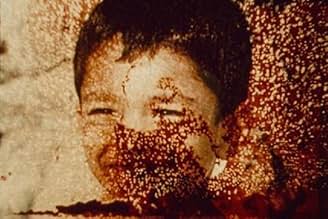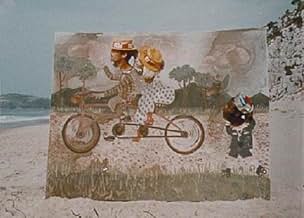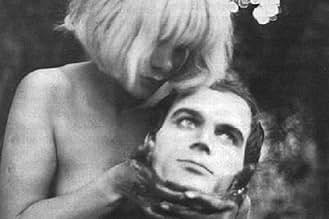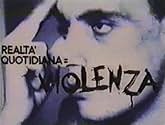Explores the complex relationship between the spirit, body, and mind. The film is a nightmare with closed eyes because it counts among the most terrible moments of my life, my second exile, ... Read allExplores the complex relationship between the spirit, body, and mind. The film is a nightmare with closed eyes because it counts among the most terrible moments of my life, my second exile, which lasted a very long time. Inspired by an ancient Hindu legend.Explores the complex relationship between the spirit, body, and mind. The film is a nightmare with closed eyes because it counts among the most terrible moments of my life, my second exile, which lasted a very long time. Inspired by an ancient Hindu legend.
Julio García Espinosa
- Self
- (archive footage)
Jean-Luc Godard
- Self
- (archive footage)
Herbert Marcuse
- Self
- (archive footage)
Jonas Mekas
- Self
- (archive footage)
Glauber Rocha
- Self
- (archive footage)
Roberto Rossellini
- Self
- (archive footage)
- Director
- Writers
- All cast & crew
- Production, box office & more at IMDbPro
Storyline
Did you know
- TriviaThis film contains over 26.000 cuts and sounds from about 700 audio tracks.
- ConnectionsVersion of La cravate (1957)
Featured review
I recently posted my 200th review on IMDB, a short film by Yugantar - India's first feminist film collective and it was restored by Arsenal (Berlin). Later, i checked the restored releases by Arsenal and ORG (1979) was part of the restoration. I remember sleeping on Fernando Birri's filmography and failed to complete the YouTube rip as it was a tedious chore without subs. This was in 2017, few days after he passed away in December.
I returned to the film today and I was shocked, it completely blew me away and i regret sleeping on this relentless onslaught. I can't believe that the shoot happened in 1967 and from 1968 to 1978 Birri dedicated himself to the project while in exile in Italy. The outcome - Birri employed over 26,000 edits and 700 audio tracks over the course of its 3-hour running time. The film debuted at Venice Biennale and was shelved right after the screening, it remained as a lost film for a long time until 1992, an edited version was shown in Germany. This edited version is the copy I saw first on YouTube and it's better to skip it after watching the Arsenal version. I know that Birri is considered as the father of the new Latin American cinema, but harsh reality is that very few cinephiles in my experience are aware of his works.
Briefly to the plot, this is an interracial love triangle, partly philosophical-spiritual, partly political, with some sci-fi more or less. The theme of the movie is based on a short novel by Thomas Mann which is in turn was borrowed from Indian legend - Vikram & Vetal short stories. This is a pure, psychedelic experience, avoiding a strict linear plot, it instead offers jump cuts, surreal images, trippy sounds and sensations. The narrative unfolds from the perspective of Grrrr, Zohommm, and Shuick and that is to be taken literally. There is not one clear interpretation to conclude this is what happened, or everyone lived happily ever after sort of ending and it's an herculean task to describe something so beyond comprehension. Bizarre doesn't even begin to describe this madness as it sets itself apart from so many others in so many ways. Birri wanted to take an unorthodox approach to filmmaking, and this includes everything from twisted images, constant changes in tones, plenty of speed in the edits, and voiceovers that make this one of the strangest, and most hypnotic experience ever. All these elements are all very reminiscent of the 60s style, and particularly it belongs to similar kind of atmosphere found in Conrad Rooks, Dusan Makavejev, Stan Brakhage, Dziga Vertov and Ron Rice films.
I recommend this madness to all the freaks around who adore the works of Pierre Clementi, Klaus Wyborny, Toshio Matsumoto, Michio Okabe, Yoshihiko Matsui, Ivan Cardoso, A. Hans Scheirl, Dietmar Schipek, Colectivo Los Ingrávidos, Sandra Lahire, Ken Jacobs, Jean-Marie Straub, Katsu Kanai, Gustav Deutsch, Ishu Patel, Pramod Pati, Deborah Stratman, Ulrike Ottinger, Robert Breer, Robert Nelson, Lawrence Jordan, Kurt Kren, Guy Maddin, Tanoa Sasraku, Arthur Cantrill, Corinne Cantrill, Pierre Bressan, Jorge Acha, Ben Rivers, Gregory J. Markopoulos, Paul Sharits, Christopher Maclaine, Jean-Pierre Bekolo, Marc Hurtado, Peggy Ahwesh, Claudine Eizykman, Maria Klonaris, Katerina Thomadaki, Stan Vanderbeek, F. J. Ossang, Robert E. Fulton, Stom Sogo, Barbara Hammer, Jamil Dehlavi, Sam Hamilton, Aryan Kaganof, Valie Export, James Benning, César Galindo, Takashi Ito, Fernando Arrabal, Jacques Perconte , Werner Nekes, Dietmar Brehm, Barbara Rubin, Fern Silva, Jon Rafman, Lisl Ponger, Manfred Neuwirth, Dennison Ramalho, Arthur Omar, Alain Montesse, Luther Price, Phil Solomon, David Lynch, Luiz Rosemberg Filho, Peter Tscherkassky, Ben Russell, Thorsten Fleisch, Takashi Makino, Zoltan Huszarik, Patrick Bokanowski, Lech Majewski, Jean-Claude Rousseau, Joao Maria Gusmao & Pedro Paiva.
I returned to the film today and I was shocked, it completely blew me away and i regret sleeping on this relentless onslaught. I can't believe that the shoot happened in 1967 and from 1968 to 1978 Birri dedicated himself to the project while in exile in Italy. The outcome - Birri employed over 26,000 edits and 700 audio tracks over the course of its 3-hour running time. The film debuted at Venice Biennale and was shelved right after the screening, it remained as a lost film for a long time until 1992, an edited version was shown in Germany. This edited version is the copy I saw first on YouTube and it's better to skip it after watching the Arsenal version. I know that Birri is considered as the father of the new Latin American cinema, but harsh reality is that very few cinephiles in my experience are aware of his works.
Briefly to the plot, this is an interracial love triangle, partly philosophical-spiritual, partly political, with some sci-fi more or less. The theme of the movie is based on a short novel by Thomas Mann which is in turn was borrowed from Indian legend - Vikram & Vetal short stories. This is a pure, psychedelic experience, avoiding a strict linear plot, it instead offers jump cuts, surreal images, trippy sounds and sensations. The narrative unfolds from the perspective of Grrrr, Zohommm, and Shuick and that is to be taken literally. There is not one clear interpretation to conclude this is what happened, or everyone lived happily ever after sort of ending and it's an herculean task to describe something so beyond comprehension. Bizarre doesn't even begin to describe this madness as it sets itself apart from so many others in so many ways. Birri wanted to take an unorthodox approach to filmmaking, and this includes everything from twisted images, constant changes in tones, plenty of speed in the edits, and voiceovers that make this one of the strangest, and most hypnotic experience ever. All these elements are all very reminiscent of the 60s style, and particularly it belongs to similar kind of atmosphere found in Conrad Rooks, Dusan Makavejev, Stan Brakhage, Dziga Vertov and Ron Rice films.
I recommend this madness to all the freaks around who adore the works of Pierre Clementi, Klaus Wyborny, Toshio Matsumoto, Michio Okabe, Yoshihiko Matsui, Ivan Cardoso, A. Hans Scheirl, Dietmar Schipek, Colectivo Los Ingrávidos, Sandra Lahire, Ken Jacobs, Jean-Marie Straub, Katsu Kanai, Gustav Deutsch, Ishu Patel, Pramod Pati, Deborah Stratman, Ulrike Ottinger, Robert Breer, Robert Nelson, Lawrence Jordan, Kurt Kren, Guy Maddin, Tanoa Sasraku, Arthur Cantrill, Corinne Cantrill, Pierre Bressan, Jorge Acha, Ben Rivers, Gregory J. Markopoulos, Paul Sharits, Christopher Maclaine, Jean-Pierre Bekolo, Marc Hurtado, Peggy Ahwesh, Claudine Eizykman, Maria Klonaris, Katerina Thomadaki, Stan Vanderbeek, F. J. Ossang, Robert E. Fulton, Stom Sogo, Barbara Hammer, Jamil Dehlavi, Sam Hamilton, Aryan Kaganof, Valie Export, James Benning, César Galindo, Takashi Ito, Fernando Arrabal, Jacques Perconte , Werner Nekes, Dietmar Brehm, Barbara Rubin, Fern Silva, Jon Rafman, Lisl Ponger, Manfred Neuwirth, Dennison Ramalho, Arthur Omar, Alain Montesse, Luther Price, Phil Solomon, David Lynch, Luiz Rosemberg Filho, Peter Tscherkassky, Ben Russell, Thorsten Fleisch, Takashi Makino, Zoltan Huszarik, Patrick Bokanowski, Lech Majewski, Jean-Claude Rousseau, Joao Maria Gusmao & Pedro Paiva.
Details
- Release date
- Country of origin
- Languages
- See more company credits at IMDbPro
Contribute to this page
Suggest an edit or add missing content


